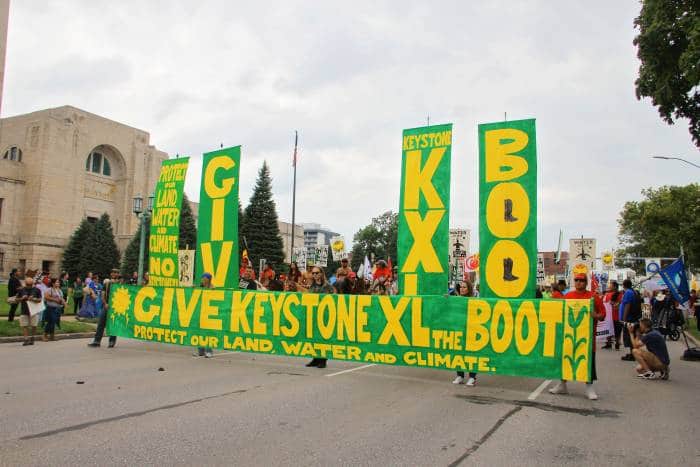Gas is a fossil fuel that, when burnt, emits deadly greenhouse gases into the atmosphere. As if that wasn’t enough to ditch it, its nature (as a gas), makes it difficult and expensive to extract, transport and contain, which translates into frequent leaks, which pose an even more immediate threat to our global climate.

March to Give #KeystoneXL the Boot. On Sunday, August 6 2017, over 600 people marched at Nebraska’s State Capitol against Keystone XL pipeline. Photo by: Juliana BrownEyes-Clifford
So how have we reached this point? Why are some politicians and lobbyists still claiming gas is a transition or (even worse) a GREEN source of energy? Let’s recap: in the last decades, people power has dealt blow after blow to the global fossil fuel industry. The spectacular rise of renewable energies and the ever growing scientific body of knowledge about the causes of the climate crisis (which is, overwhelmingly and in case anyone needs a reminder, the burning of fossil fuels), combined with the tireless activism of organizations, individuals and everything in between all over the world, means that the old fossil industry has been caught on its back feet. Some of its products, such as coal, have become so toxic that countries, cities and companies in the whole world are putting an expiry date on them or even ditching them completely.
As a response, the fossil fuel industry has doubled down on fossil gas. This gas is a mix composed mostly of methane (CH4), a powerful greenhouse gas that is up to 86 times more climate-wrecking than CO2. So even if it emits slightly less CO2 when burnt than coal or oil, it is still extremely harmful, as leaks of methane are impossible to avoid entirely. As soon as leaks are above 3% that supposed reduction in climate damage is offset. And leaks happen at all stages of the fossil gas life cycle: production, transport (by pipeline or LNG vessels) and consumption!
But let’s not stay on the emissions and leaks! Let’s move forward from the wrecking effects on climate and let’s also keep in mind where fossil gas comes from. As every fossil fuel product, the production of fossil gas is centralised in a few spots on Earth, where its concentration makes its extraction financially profitable to the fossil industry and its allies. And as with every other fossil fuel product, their extraction means damages to communities livelihoods, health and cultures. It means light, noise, air and water pollution, overcrowded public services, destruction of natural resources. In some cases, such as where fracking is practised as an extraction method, local communities even have to deal with earthquakes.
To make matters worse, the inherent price volatility of gas means that populations of gas extracting countries in the Global South are often priced out of even locally extracted gas. As a result, switching to much cheaper renewable energy would save the cost of the toll bridge, which is huge.

Community resistance against the TransAdriatic Gas Pipeline in Salento, Italy Photo: Alessandra Tommasi.
The fossil industry will not stop representing gas as a green solution in the future. From hypocritically naming it “natural” gas to exaggerating their supposed advantages compared to coal, they still fight tooth and nail to convince politicians and communities that this is a valid and even necessary transition to a greener future, but the fact is that gas is a bridge to nowhere, and the fossil industry’s last stand. The safe path into the future is clear: no more coal, no more oil AND NO MORE GAS!